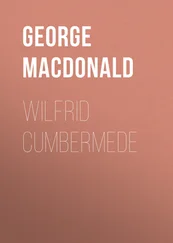George MacDonald - Warlock o' Glenwarlock - A Homely Romance
Здесь есть возможность читать онлайн «George MacDonald - Warlock o' Glenwarlock - A Homely Romance» — ознакомительный отрывок электронной книги совершенно бесплатно, а после прочтения отрывка купить полную версию. В некоторых случаях можно слушать аудио, скачать через торрент в формате fb2 и присутствует краткое содержание. Издательство: Иностранный паблик, Жанр: foreign_prose, foreign_religion, foreign_antique, на английском языке. Описание произведения, (предисловие) а так же отзывы посетителей доступны на портале библиотеки ЛибКат.
- Название:Warlock o' Glenwarlock: A Homely Romance
- Автор:
- Издательство:Иностранный паблик
- Жанр:
- Год:неизвестен
- ISBN:нет данных
- Рейтинг книги:3 / 5. Голосов: 1
-
Избранное:Добавить в избранное
- Отзывы:
-
Ваша оценка:
- 60
- 1
- 2
- 3
- 4
- 5
Warlock o' Glenwarlock: A Homely Romance: краткое содержание, описание и аннотация
Предлагаем к чтению аннотацию, описание, краткое содержание или предисловие (зависит от того, что написал сам автор книги «Warlock o' Glenwarlock: A Homely Romance»). Если вы не нашли необходимую информацию о книге — напишите в комментариях, мы постараемся отыскать её.
Warlock o' Glenwarlock: A Homely Romance — читать онлайн ознакомительный отрывок
Ниже представлен текст книги, разбитый по страницам. Система сохранения места последней прочитанной страницы, позволяет с удобством читать онлайн бесплатно книгу «Warlock o' Glenwarlock: A Homely Romance», без необходимости каждый раз заново искать на чём Вы остановились. Поставьте закладку, и сможете в любой момент перейти на страницу, на которой закончили чтение.
Интервал:
Закладка:
"Decant it. Leave the last glass in the bottom."
The laird filled a decanter, and set it before him.
"Haven't you a mangum-jug?"
"No, my lord."
"Then fill another decanter, and mind the last glass."
"I have not another decanter, my lord."
"Not got two decanters, you fool?" sneered his lordship, enraged at not having the whole bottle set down to him at once. "But after all," he resumed, "it mayn't be worth a rush, not to say a decanter. Bring the bottle. Set it down. Here!—Carefully! Bring a glass. You should have brought the glasses first. Bring three; I like to change my glass. Make haste, will you!"
The laird did make haste, smiling at the exigence of his visitor. Lord Mergwain listened to the glug-glug in the long neck of the decanter as if it had been a song of love, and the moment it was over, was holding the glass to his nose.
"Humph! Not much aroma here!" he growled, "I ought to have made the old fool"—the laird must have been some fifteen years younger than he.—"set it down before the fire—only what would have become of me while it was thawing? It's no wonder though! By the time I've been buried as long, I shall want thawing too!"
The wine, however, turned out more satisfactory to the palate of the toper than to his nostrils—which in truth, so much had he drunk that day, were at present incapable of doing it justice—and he set himself to enjoy it. How that should be possible to a man for whom the accompanying dried olives of memory could do so little, I find it difficult to understand. One would think, to enjoy his wine alone, a man must have either good memories or good hopes: Lord Mergwain had forgotten the taste of hope; and most men would shrink from touching the spring that would set a single scene of such a panorama unrolling itself, as made up the past of Lord Mergwain. However there he sat, and there he drank, and, truth to tell, now and then smiled grimly.
The laird set a pair of brass candlesticks on the table—there were no silver utensils any more in the house of Glenwarlock; years ago the last of them had vanished—and retired to a wooden chair at the end of the hearth, under the lamp that hung on the wall. But on his way he had taken from a shelf an old, much-thumbed folio which Mr. Simon had lent him—the journal of George Fox, and the panorama which then for a while kept passing before his mind's eye, was not a little different from that passing before Lord Mergwain's. What a study to a spirit able to watch the unrolling of the two side by side!
In a few minutes Grizzie entered, carrying a fowl newly killed, its head almost touching the ground at the end of its long, limp neck. She seated herself on a stool, somewhere about the middle of the large space, and proceeded to pluck, and otherwise prepare it for the fire. Having, last of all, split it open from end to end, turning it into something like an illegible heraldic crest, she approached the fire, the fowl in one hand, the gridiron in the other.
"I doobt I maun get his lordship to sit a wee back frae the fire," she said. "I maun jist bran'er this chuckie for his supper."
Lady Joan had taken Mrs. Warlock's chair, and her father had taken the laird's, and pulled it right in front of the fire, where a small deal table supported his bottle, his decanter, and his three glasses.
"What does the woman mean?" said his lordship. "—Oh! I see; a spread-eagle!—But is my room not ready yet? Or haven't you one to sit in? I don't relish feasting my nose so much in advance of my other senses."
"Ow! nae fear o' yer lordship's nose,'cep' it be frae yer lordship's hose, my lord!" said Grizzie, "for I doobt ye're birstlin' yer lordship's shins! I'll tak the cratur oot to the cairt-shed, an' sing' 't there first. But 'deed I wadna advise ye to gang to yer room a minute afore ye need, for it winna be that warm the nicht. I hae made a fire 'at's baith big an' bricht, an' fit to ro'st Belzebub—an' I beg your pardon, laird—but it's some days—I micht say ooks—sin' there was a fire intil 't, an' the place needs time to tak the heat intil its auld neuks."
She might have said years not a few, instead of some weeks, but her truthfulness did not drive her so far. She turned, and left the house, carrying with her the fowl to singe.
"Here," said his lordship to his host, "move back this table and chair a bit, will you? I don't relish having the old witch fussing about my knees. What a mistake it is not to have rooms ready for whoever may come!"
The laird rose, laid his book down, and moved the table, then helped his guest to rise, moved his chair, and placed the screen again betwixt him and the door. Lord Mergwain re-settled himself to his bottle.
In the meantime, in the guest-chamber, which had for so long entertained neither friend nor stranger, Cosmo and Aggie were busy—too busy to talk much—airing the linen, dusting the furniture, setting things tidy, and keeping up a roaring fire. For this purpose the remnants of an old broken-down cart, of which the axle was anciently greasy, had been fetched from the winter-store, and the wood and peats together, with a shovelful of coal to give the composition a little body, had made a glorious glow. But the heat had hardly yet begun to affect sensibly the general atmosphere of the place. It was a large room, the same size as the drawing-room immediately under it, and still less familiar to Cosmo. For, if the latter filled him with a kind of loving awe, the former caused him a kind of faint terror, so that, in truth, even in broad daylight, at no time was he willing to enter it. Now and then he would open the door in passing, and for a moment stand peering in, with a stricken, breath-bating enjoyment of the vague atmosphere of dread, which, issuing, seemed to envelope him in its folds; but to go in was too much, and he neither desired nor endured even the looking in for more than a few seconds. For so long it was to him like a page in a book of horrors: to go to the other end of it, and in particular to approach the heavily curtained bed, was more than he cared to do without cogent reason. At the same time he rejoiced to think there was such a room in the house, and attached to it an idea of measureless value—almost as if it had a mysterious window that looked out upon the infinite. The cause of this feeling was not to himself traceable. Until old Grannie's story, he had heard no tale concerning it that he remembered: he may have heard hints—a word dropped may have made its impression, and roused fancies outlasting the memory of their origin; for feelings, like memories of scents and sounds, remain, when the related facts have vanished. What it was about the room that scared him, he could not tell, but the scare was there. With a companion like Aggie, however, even after hearing Grannie's terrible reminiscence, he was able to be in the room without experiencing worse than that same milder, almost pleasant degree of dread, caused by the mere looking through the door into the strange brooding silence of the place. But, I must confess, this applies only to the space on the side of the bed next the fire. The bed itself—not to mention the shadowy region beyond it—on which the body of the pirate had lain, he could not regard without a sense of the awfully gruesome: itself looked scared at its own consciousness of the fact, and of the feeling it caused in the beholder.
In the strength of Aggie's presence, he was now able to take a survey of the room such as never before. Over walls, floor, and ceiling, his eyes were wandering, when suddenly a question arose on which he desired certainty: "Is there," he said to himself, "a door upo' the ither side o' the bed?"
"Did Grannie mak mention o' sic a door?" he asked himself next, and could not be certain of the answer. He gazed around him, and saw no door other than that by which they had entered, but at the head of the bed, on the other side, was a space hidden by the curtain: it might be there! When they went to put the sheets on the bed, he would learn! He dared not go till then! "Dare not!" he repeated to himself—and went at once.
Читать дальшеИнтервал:
Закладка:
Похожие книги на «Warlock o' Glenwarlock: A Homely Romance»
Представляем Вашему вниманию похожие книги на «Warlock o' Glenwarlock: A Homely Romance» списком для выбора. Мы отобрали схожую по названию и смыслу литературу в надежде предоставить читателям больше вариантов отыскать новые, интересные, ещё непрочитанные произведения.
Обсуждение, отзывы о книге «Warlock o' Glenwarlock: A Homely Romance» и просто собственные мнения читателей. Оставьте ваши комментарии, напишите, что Вы думаете о произведении, его смысле или главных героях. Укажите что конкретно понравилось, а что нет, и почему Вы так считаете.












